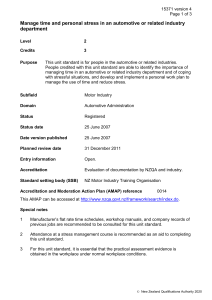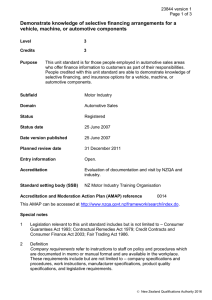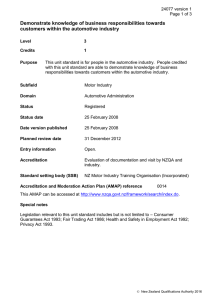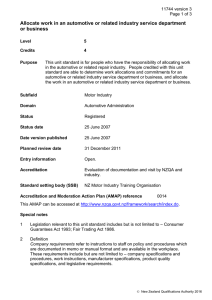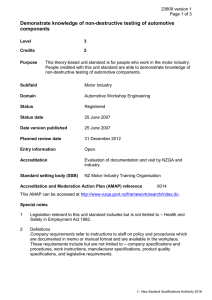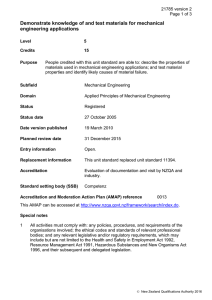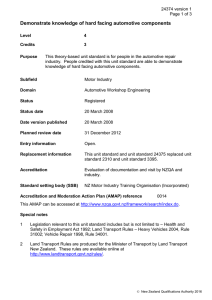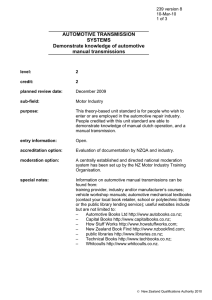Carry out a non-destructive test to determine serviceability of automotive components
advertisement
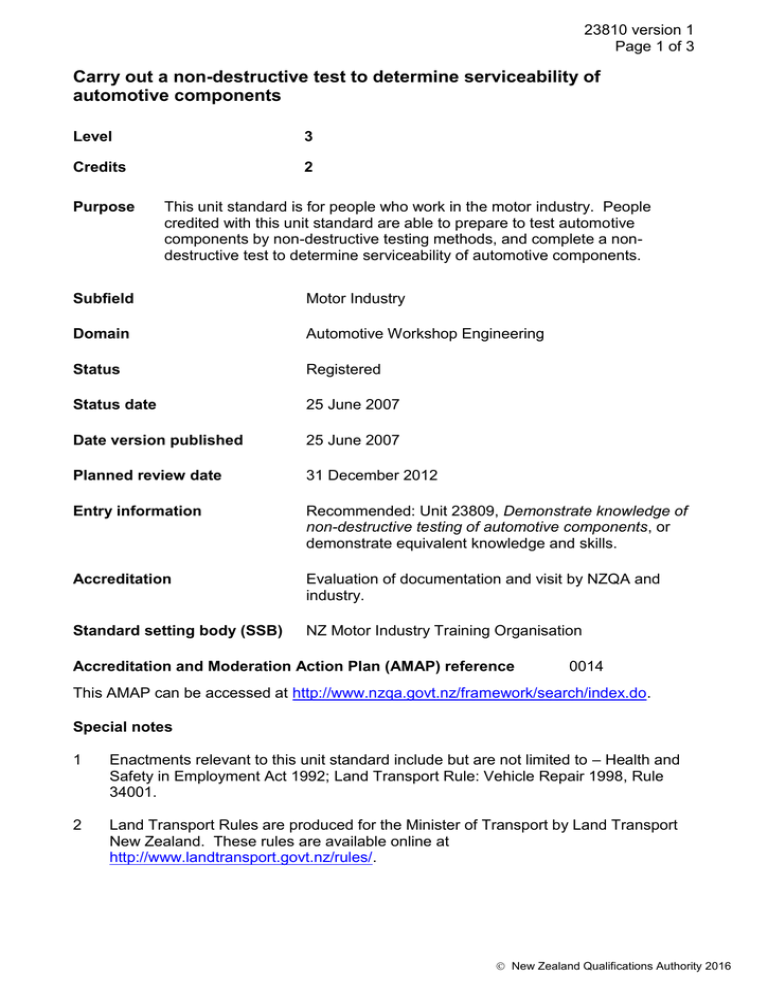
23810 version 1 Page 1 of 3 Carry out a non-destructive test to determine serviceability of automotive components Level 3 Credits 2 Purpose This unit standard is for people who work in the motor industry. People credited with this unit standard are able to prepare to test automotive components by non-destructive testing methods, and complete a nondestructive test to determine serviceability of automotive components. Subfield Motor Industry Domain Automotive Workshop Engineering Status Registered Status date 25 June 2007 Date version published 25 June 2007 Planned review date 31 December 2012 Entry information Recommended: Unit 23809, Demonstrate knowledge of non-destructive testing of automotive components, or demonstrate equivalent knowledge and skills. Accreditation Evaluation of documentation and visit by NZQA and industry. Standard setting body (SSB) NZ Motor Industry Training Organisation Accreditation and Moderation Action Plan (AMAP) reference 0014 This AMAP can be accessed at http://www.nzqa.govt.nz/framework/search/index.do. Special notes 1 Enactments relevant to this unit standard include but are not limited to – Health and Safety in Employment Act 1992; Land Transport Rule: Vehicle Repair 1998, Rule 34001. 2 Land Transport Rules are produced for the Minister of Transport by Land Transport New Zealand. These rules are available online at http://www.landtransport.govt.nz/rules/. New Zealand Qualifications Authority 2016 23810 version 1 Page 2 of 3 3 Definitions Company requirements refer to instructions to staff on policy and procedures which are documented in memo or manual format and are available in the workplace. These requirements include but are not limited to – company specifications and procedures, work instructions, manufacturer specifications, product quality specifications, and legislative requirements. Suitable tools and equipment means industry approved tools and equipment that are recognised within the industry as being the most suited to complete the task in a professional and competent manner with due regard to safe working practices. 4 Range Assessment against this unit standard applies to both dye penetrant and magnetic particle testing methods. Elements and performance criteria Element 1 Prepare to test automotive components by non-destructive testing methods. Performance criteria 1.1 Preparation requirements are identified in accordance with the test and component manufacturer instructions and company requirements. Range 1.2 may include but is not limited to – determining company instructions, dismantling components, cleaning components, level and extent of checking. The automotive component is prepared ready for testing using suitable tools and equipment in accordance with the test and component manufacturer instructions and company requirements. Element 2 Complete a non-destructive test to determine serviceability of automotive components. Range evidence is required for one dye penetrant and one magnetic particle test. Performance criteria 2.1 Testing and inspection procedures are carried out in accordance with the test manufacturer instructions. 2.2 The results of the testing and inspection procedure are documented and reported to the supervisor in accordance with company requirements. New Zealand Qualifications Authority 2016 23810 version 1 Page 3 of 3 Please note Providers must be accredited by NZQA, or an inter-institutional body with delegated authority for quality assurance, before they can report credits from assessment against unit standards or deliver courses of study leading to that assessment. Industry Training Organisations must be accredited by NZQA before they can register credits from assessment against unit standards. Accredited providers and Industry Training Organisations assessing against unit standards must engage with the moderation system that applies to those standards. Accreditation requirements and an outline of the moderation system that applies to this standard are outlined in the Accreditation and Moderation Action Plan (AMAP). The AMAP also includes useful information about special requirements for organisations wishing to develop education and training programmes, such as minimum qualifications for tutors and assessors, and special resource requirements. Comments on this unit standard Please contact the NZ Motor Industry Training Organisation jlane@mito.org.nz if you wish to suggest changes to the content of this unit standard. New Zealand Qualifications Authority 2016
